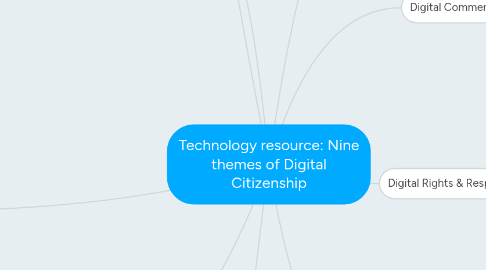Technology resource: Nine themes of Digital Citizenship
作者:Georgiana Willetts


1. Digital Literacy
1.1. While schools have made great progress in the area of technology infusion, much remains to be done. A renewed focus must be made on what technologies must be taught as well as how it should be used. New technologies are finding their way into the work place that are not being used in schools (e.g., Videoconferencing, online sharing spaces such as wikis). In addition, workers in many different occupations need immediate information (just-in-time information). This process requires sophisticated searching and processing skills (i.e., information literacy). Learners must be taught how to learn in a digital society. In other words, learners must be taught to learn anything, anytime, anywhere. Business, military, and medicine are excellent examples of how technology is being used differently in the 21st century. As new technologies emerge, learners need to learn how to use that technology quickly and appropriately. Digital Citizenship involves educating people in a new way— these individuals need a high degree of information literacy skills.
1.2. Process of teaching and learning about technology and the use of technology
2. Digital Etiquette
2.1. Technology users often see this area as one of the most pressing problems when dealing with Digital Citizenship. We recognize inappropriate behavior when we see it, but before people use technology they do not learn digital etiquette (i.e., appropriate conduct). Many people feel uncomfortable talking to others about their digital etiquette. Often rules and regulations are created or the technology is simply banned to stop inappropriate use. It is not enough to create rules and policy, we must teach everyone to become responsible digital citizens in this new society.
2.2. Electronic standards of conduct or procedure
3. Digital Law
3.1. Digital law deals with the ethics of technology within a society. Unethical use manifests itself in form of theft and/or crime. Ethical use manifests itself in the form of abiding by the laws of society. Users need to understand that stealing or causing damage to other people’s work, identity, or property online is a crime. There are certain rules of society that users need to be aware in a ethical society. These laws apply to anyone who works or plays online. Hacking into others information, downloading illegal music, plagiarizing, creating destructive worms, viruses or creating Trojan Horses, sending spam, or stealing anyone’s identify or property is unethical.
3.2. Electronic responsibility for actions and deeds
4. Digital Health & Wellness
4.1. Detailed description: Eye safety, repetitive stress syndrome, and sound ergonomic practices are issues that need to be addressed in a new technological world. Beyond the physical issues are those of the psychological issues that are becoming more prevalent such as Internet addiction. Users need to be taught that there are inherent dangers of technology. Digital Citizenship includes a culture where technology users are taught how to protect themselves through education and training.
4.2. Physical and psychological well-being in a digital technology world. Possible learning intentions:
4.2.1. The effects of repetitive stress syndrome and how to avoid it.
4.2.2. Learn about eye safety and why it is important.
4.2.3. Why it is important to know about sound ergonomic practices and how to be be aware of it and improve.
4.2.4. Why physical well being is important and how we can use safe practices while using technology.
4.2.5. Learn about what phycological issues we could encounter using digital technology.
4.2.6. how to be a digital citizen.
4.2.7. Learn about the technological world.
